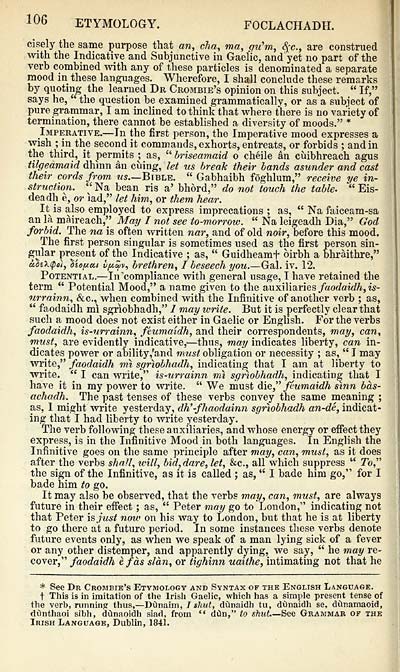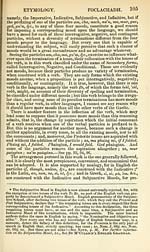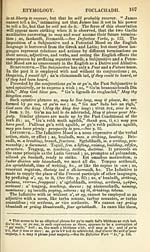Books and other items printed in Gaelic from 1841 to 1870 > Stéidhean a' Ghràmair Ghaëlig
(134) Page 106
Download files
Complete book:
Individual page:
Thumbnail gallery: Grid view | List view

106 ETYMOLOGT. FOCLACHADH.
cisely the same purpose that an, clia, ma, gu'm, 8[c, are construed
with the Indicative and Subjunctive in Gael'ic, and'yet no part of the
verb combined with any of these particles is denominated a separate
mood in these languages. Wherefore, I shall conclude these remarks
by quoting the learned Dr Crombie's opinion on this subject. " If,"
says he, " the question be examined grammatically, or as a subject of
pure grammar, I am inclined to think that where there is no var'iety of
termination, there cannot be established a diversity of moods." *
Imperative. — In the first person, the Imperative mood expresses a
wish ; in the second it commands,exhorts, entreats, or forbids ; andin
the third, it permits ; as, " òriseamaid o chèile àn cùibhreach agus
tilgeamaid dhìnn àn cùing, let us break their bands asunder and cast
their cords from us — Bible. " Gabhaibh fòghlum," receive ye in-
struction. " Na bean ris a' bhòrd," do not touch the table. " Eis-
deadh è, or ìad," let him, or them hear.
It is also employed to express imprecations ; as, " Na faiceam-sa
an là màireach,'' May I not see to-morrow. " Na leigeadh Dia," God
forbid. The na is often written nar, and of old noir, before this mood.
The first person singular is sometimes used as the first person sin-
gular present of the Indicative ; as, " Guidheamf òirbh a bhràithre,"
àìtXipeì, ìtofzcn òftav, brethren, I beseech you. — Gal. iv. 12.
Potential. — Iir compliance with general usage, I have retained the
term " Potential Mood," a name given to the auxiliaries faodaidh, is-
nrrainn, &c, when combined with the Infìnitive of another verb ; as,
" faodaidh mì sgrìobhadh," / may write. But it is perfectly clear that
such a mood does not exist either in Gaelic or English. For the verbs
faodaidh, is-urrainn, fèumaidh, and their correspondents, may, can,
must, are evidently indicative, — thus, may indicates liberty, can in-
dicates power or ability, p and must obligation or necessity ; as, " I may
write," faodaidh mì sgrìobhadh, indicating that I am at liberty to
write.^ " I can write," is-urrainn mi sgrìobhadh, indicating^ that I
have it in my power to write. " We must die," fèumaidh sinn bàs-
achadh. The past tenses of these verbs convey the same meaning ;
as, I might write yesterday, dh'-fhaodainn sgriobhadh an-dè, indicat-
ing that I had liberty to write yesterday.
The verb following these auxiliaries, and whose energy or effect they
express, is in the Infinitive Mood in both languages. In English the
Infinitive goes on the same principle after may, can, must, as it does
after the verbs shall, will, bid,dare, let, &c, all which suppress " To"
the sign of the Infinitive, as it is called ; as, " I bade him go," for I
bade him to go.
It may also be observed, that the verbs may, can, must, are always
future in their effect ; as, " Peter may go to 'London," indicating not
that Peter is just now on his way to London, but that he is at liberty
to go there at a future period. In some instances these verbs denote
future events only, as when we speak of a man lying sick of a fever
or any other distemper, and apparently dying, we say, " he may re-
cover," faodaidh èfàs slàn, or tighinn uaithe, intimating not that he
* See Dr Crombie's Etymology and Syntax of the English Language.
t This is in imitation of the lrish Gaelic, which has a simple present tense of
the verb, running thus, — Dùnaim, I shut, dùnaidh tu, dùnaidh se, dùnamaoid,
dùnthaoi sibh, dùnaoidh siad, from " dùn," to shut — See Grammar of the
Irish Language, Dublin, 1841.
cisely the same purpose that an, clia, ma, gu'm, 8[c, are construed
with the Indicative and Subjunctive in Gael'ic, and'yet no part of the
verb combined with any of these particles is denominated a separate
mood in these languages. Wherefore, I shall conclude these remarks
by quoting the learned Dr Crombie's opinion on this subject. " If,"
says he, " the question be examined grammatically, or as a subject of
pure grammar, I am inclined to think that where there is no var'iety of
termination, there cannot be established a diversity of moods." *
Imperative. — In the first person, the Imperative mood expresses a
wish ; in the second it commands,exhorts, entreats, or forbids ; andin
the third, it permits ; as, " òriseamaid o chèile àn cùibhreach agus
tilgeamaid dhìnn àn cùing, let us break their bands asunder and cast
their cords from us — Bible. " Gabhaibh fòghlum," receive ye in-
struction. " Na bean ris a' bhòrd," do not touch the table. " Eis-
deadh è, or ìad," let him, or them hear.
It is also employed to express imprecations ; as, " Na faiceam-sa
an là màireach,'' May I not see to-morrow. " Na leigeadh Dia," God
forbid. The na is often written nar, and of old noir, before this mood.
The first person singular is sometimes used as the first person sin-
gular present of the Indicative ; as, " Guidheamf òirbh a bhràithre,"
àìtXipeì, ìtofzcn òftav, brethren, I beseech you. — Gal. iv. 12.
Potential. — Iir compliance with general usage, I have retained the
term " Potential Mood," a name given to the auxiliaries faodaidh, is-
nrrainn, &c, when combined with the Infìnitive of another verb ; as,
" faodaidh mì sgrìobhadh," / may write. But it is perfectly clear that
such a mood does not exist either in Gaelic or English. For the verbs
faodaidh, is-urrainn, fèumaidh, and their correspondents, may, can,
must, are evidently indicative, — thus, may indicates liberty, can in-
dicates power or ability, p and must obligation or necessity ; as, " I may
write," faodaidh mì sgrìobhadh, indicating that I am at liberty to
write.^ " I can write," is-urrainn mi sgrìobhadh, indicating^ that I
have it in my power to write. " We must die," fèumaidh sinn bàs-
achadh. The past tenses of these verbs convey the same meaning ;
as, I might write yesterday, dh'-fhaodainn sgriobhadh an-dè, indicat-
ing that I had liberty to write yesterday.
The verb following these auxiliaries, and whose energy or effect they
express, is in the Infinitive Mood in both languages. In English the
Infinitive goes on the same principle after may, can, must, as it does
after the verbs shall, will, bid,dare, let, &c, all which suppress " To"
the sign of the Infinitive, as it is called ; as, " I bade him go," for I
bade him to go.
It may also be observed, that the verbs may, can, must, are always
future in their effect ; as, " Peter may go to 'London," indicating not
that Peter is just now on his way to London, but that he is at liberty
to go there at a future period. In some instances these verbs denote
future events only, as when we speak of a man lying sick of a fever
or any other distemper, and apparently dying, we say, " he may re-
cover," faodaidh èfàs slàn, or tighinn uaithe, intimating not that he
* See Dr Crombie's Etymology and Syntax of the English Language.
t This is in imitation of the lrish Gaelic, which has a simple present tense of
the verb, running thus, — Dùnaim, I shut, dùnaidh tu, dùnaidh se, dùnamaoid,
dùnthaoi sibh, dùnaoidh siad, from " dùn," to shut — See Grammar of the
Irish Language, Dublin, 1841.
Set display mode to:
![]() Universal Viewer |
Universal Viewer | ![]() Mirador |
Large image | Transcription
Mirador |
Large image | Transcription
Images and transcriptions on this page, including medium image downloads, may be used under the Creative Commons Attribution 4.0 International Licence unless otherwise stated. ![]()
| Rare items in Gaelic > Books and other items printed in Gaelic from 1841 to 1870 > Stéidhean a' Ghràmair Ghaëlig > (134) Page 106 |
|---|
| Permanent URL | https://digital.nls.uk/101713207 |
|---|
| Description | Out-of-copyright books printed in Gaelic between 1631 and 1900. Also some pamphlets and chapbooks. Includes poetry and songs, religious books such as catechisms and hymns, and different editions of the Bible and the Psalms. Also includes the second book ever published in Gaelic in 1631. |
|---|

